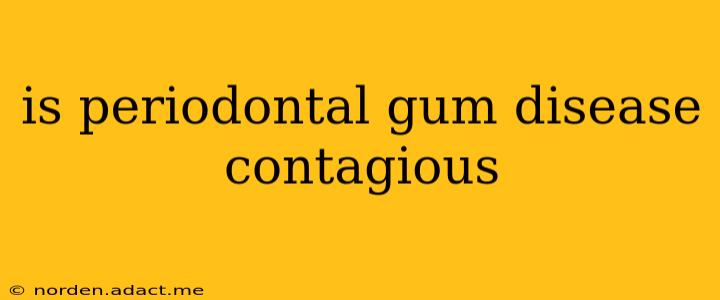Periodontal disease, also known as gum disease, is a common infection affecting the gums and supporting structures of the teeth. While it's not directly contagious in the same way as, say, the flu, the bacteria responsible for its development can be transmitted. This means it's not something you'll catch by simply being near someone with the disease, but there are ways it can spread. Let's delve deeper into this important topic.
Can Gum Disease Be Spread Through Kissing?
This is a frequently asked question, and the answer is a nuanced one. While kissing itself isn't a primary method of transmission, the bacteria associated with gum disease, particularly Porphyromonas gingivalis, Tannerella forsythia, and Treponema denticola, can be exchanged through saliva. However, simply kissing someone with gum disease doesn't automatically mean you'll develop it. The presence of these bacteria in your mouth doesn't guarantee infection; the development of periodontal disease depends on several factors, including your individual immune response and oral hygiene practices.
Is Gum Disease Hereditary?
While not directly contagious in a person-to-person sense, there's a genetic component to susceptibility to gum disease. Some individuals are genetically predisposed to a weaker immune response, making them more vulnerable to bacterial infections like periodontal disease. This doesn't mean it's automatically inherited, but rather that genetic factors can influence your risk.
What are the Risk Factors for Periodontal Disease?
Many factors contribute to the development of periodontal disease, and not all are related to transmission. These include:
- Poor oral hygiene: Inadequate brushing and flossing allow bacteria to accumulate and thrive.
- Smoking: Smoking significantly increases the risk and severity of gum disease.
- Diabetes: Uncontrolled diabetes weakens the immune system, making individuals more susceptible to infections.
- Stress: Chronic stress can negatively impact overall health, including oral health.
- Certain medications: Some medications have side effects that can impact gum health.
- Genetics: As mentioned above, a family history of periodontal disease increases your risk.
How Can I Reduce My Risk of Developing Gum Disease?
Maintaining excellent oral hygiene is paramount. This includes:
- Brushing twice daily: Use fluoride toothpaste and a soft-bristled toothbrush.
- Flossing daily: This removes plaque and food particles from between your teeth.
- Regular dental checkups: Professional cleanings and examinations help detect and treat gum disease early.
- Quitting smoking: Smoking significantly increases your risk of gum disease.
- Controlling diabetes: Maintaining healthy blood sugar levels is crucial for overall health and reduces infection risk.
- Managing stress: Employ stress-reduction techniques like exercise, meditation, or yoga.
Is Gum Disease Always Serious?
Early stages of gum disease, known as gingivitis, are often reversible with improved oral hygiene. However, if left untreated, it can progress to periodontitis, a more severe form that can lead to tooth loss. Early detection and treatment are crucial for preventing serious complications.
Conclusion:
While not directly contagious in the way a virus is, the bacteria associated with gum disease can be transferred through close contact, most notably through saliva. However, the development of periodontal disease is dependent on multiple factors. Maintaining excellent oral hygiene, regular dental checkups, and addressing underlying health conditions are essential for preventing and managing gum disease. If you have concerns about your gum health, consult a dentist or periodontist for professional advice and treatment.
